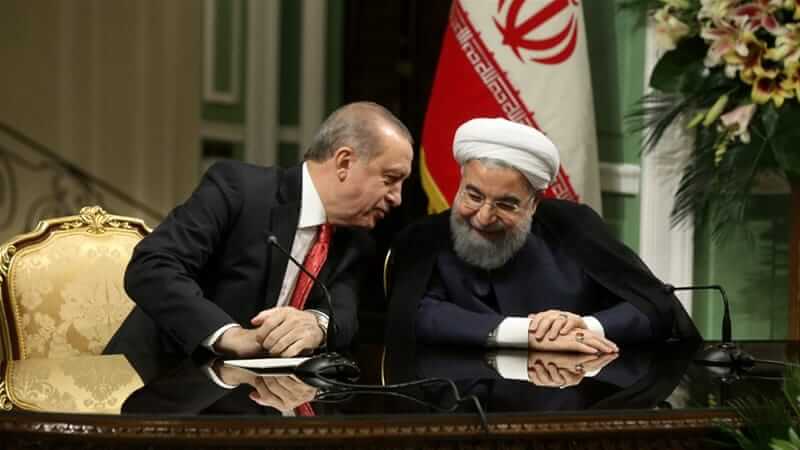On Tuesday, Turkey and Iran will be holding the 6th Turkish-Iranian High-Level Cooperation Council (HLCC) talks via video conference. Turkish President Recep Tayyip Erdogan and Iranian President Hassan Rouhani are set to co-chair the meeting. A statement from Turkey’s Communications Directorate revealed that the leaders would be reviewing “all aspects of bilateral relations between Turkey and Iran.” They will also be discussing further steps to enhance cooperation, especially in light of the ongoing coronavirus pandemic. “Views on bilateral relations as well as regional and international matters are also expected to be exchanged at the meeting,” the statement added.
The HLCC was established in 2014 to provide a “structured basis” to the Turkish-Iranian dialogue. In the last meeting that took place in Ankara in 2018, the two leaders discussed bilateral, regional, and international relations and developments. At the Turkey-Iran Business Forum that followed the Council meeting that day, Erdogan argued that both countries needed to work towards ensuring that sanctions from Washington do not impede their bilateral targets. Instead, he said that he believed that the United States’ (US) sanctions could provide an opportunity for the neighbors to enhance their bilateral ties. “No one should expect us to end economic and trade relations with Iran due to the sanctions,” Erdogan said. Similarly, Rouhani stated that the potential for economic ties between the two countries was encouraging Turkish businesses to invest in Iranian energy. Iran and Turkey also participated in trilateral meetings with Russia in 2019, where they discussed the need for regional and economic security in Syria.
Simultaneously, in the aftermath of a recent ceasefire agreement between the warring factions in Libya, on 6 September, Erdogan met with Fayez Al-Sarraj, the leader of Libya’s internationally recognized Government of National Accord (GNA). The visit came after several senior Libyan officials, who had held meetings with Turkish authorities, announced the ceasefire. However, it was contingent upon the creation of a demilitarized area in Sirte and the resumption oil production. Renegade general Khalifa Haftar’s Libyan National Army (LNA) dismissed the ceasefire as a marketing stunt, stating that rival GNA forces were mobilizing around front lines in Sirte and Jufra, strategic areas for both sides. Turkey’s Vice President Fuat Oktay said that Ankara would “love it” if the ceasefire declared on 21 August is successful, but raised doubts after the LNA’s rejection of the move. “We see there are points by Serraj and [Aguila] Saleh that are good points, like lifting the (oil) embargo, but there are some issues with the statements as well,” said Oktay.
Turkey and Iran to Hold High-Level Talks Today
The 6th Turkish-Iranian High-Level Cooperation Council (HLCC) talks will be held via video conference
September 8, 2020

Turkish President Recep Tayyip Erdogan (L) and his Iranian counterpart Hassan Rouhani in 2017. SOURCE: AL JAZEERA
